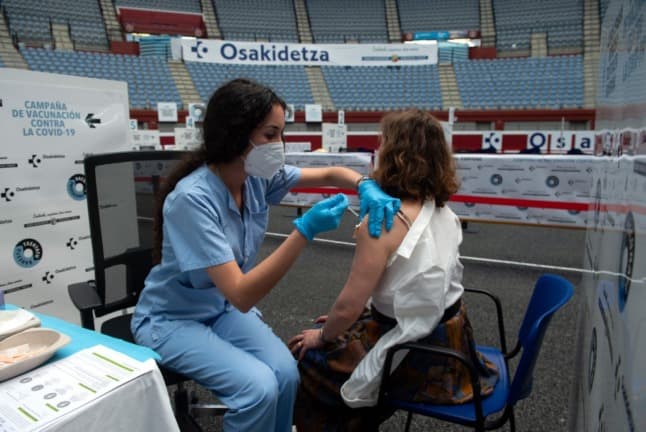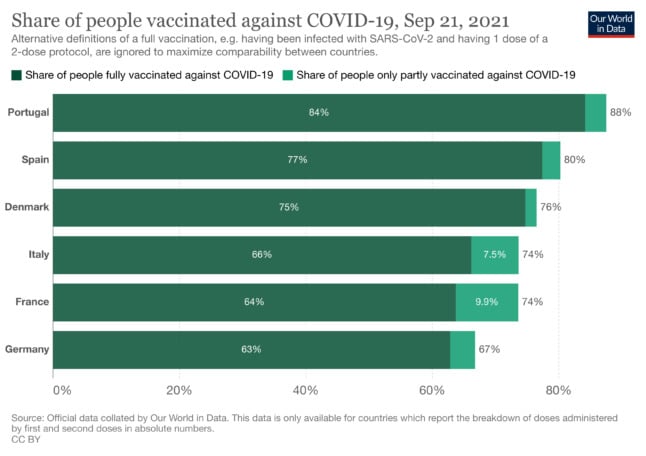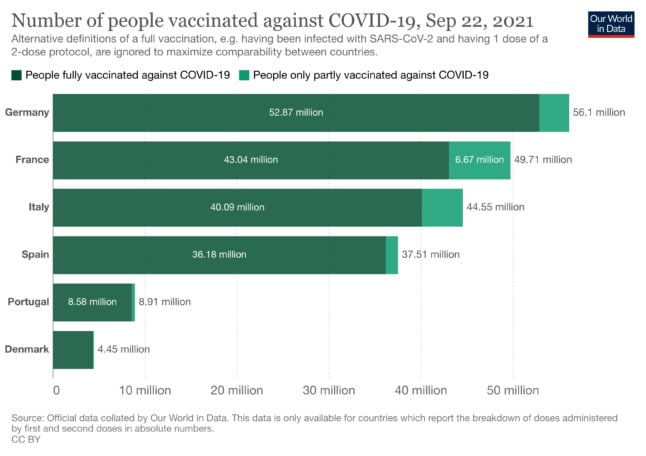Why does Spain top Europe's Covid vaccination league table?

With 80 percent of its population having received at least one dose of the vaccine, Spain boasts one of the highest vaccination rates in the European Union. So what are the reasons behind the country's successful inoculation campaign?
More than 77 percent of Spain's population of 47 million have been fully vaccinated, the highest rates among rates among large European Union countries – ahead from Italy's 66 percent and France's 63 percent, according to Our World in Data.
Only Portugal is further ahead with 84 percent fully vaccinated, and Denmark, which recently became the only country in Europe with no Covid-19 restrictions, is trails behind at 74 percent.


Trust in the health system
One of the cornerstones of Spain's successful vaccine drive is trust in the health system, Josep Lobera, a sociology professor at the Autonomous University of Madrid, told AFP.
This means there is very little vaccine hesitancy. "We have an advantage with respect to other nations, because confidence in vaccines in general especially childhood vaccines is traditionally higher than in other European nations," said Llobera, who sits in the government's vaccine strategy committee.
A study by Imperial College London published in June found that 79 percent of people in Spain trusted Covid-19 vaccines, compared to 62 percent in the US, 56 percent in France and 47 percent in Japan.
While France and Italy have seen large protests against mandatory vaccines for healthcare workers, and a health pass has been implemented to give them access to museums and restaurants, such measures haven't been necessary in Spain.
"Practically everyone gets vaccinated voluntarily," Education Minister Pilar Alegría told news radio Cadena Ser, which means there was no need to make vaccination mandatory for teacher and other key workers.
READ ALSO: 3,000 unvaccinated French healthcare workers suspended from work
At one point, Spaniards under 35 in the Basque Country were so eager to get the vaccine that they even crossed the border over to France, where they were able to get the vaccine sooner than in Spain.
Set up after Spain returned to democracy following the death of dictator Francisco Franco in 1975, the country's public health care system offers free universal coverage as a constitutionally guaranteed right. As a result, most Spaniards associate it with modernity, said Lobera.
Close family ties also explain the willingness to get vaccinated in Spain: 55 percent of peopled aged between 25 and 29 still live with their parents.
Alejandro Costales, a 30-year-old lawyer who was waiting to be vaccinated, said this was a way “to care a bit” for his family. “It gives the guarantee that I can go home and not infect them,” he said.
Lobera said it was much harder for young people in Spain to become independent, as job precarity is high. “This means the family acts as a life preserver” during crises, he explained.
Polio trauma
The high confidence in the health system goes back to Spain's traumatic experience with the polio vaccine.
While several nations began polio vaccination in the mid 1950s, the authorities under Franco waited nearly a decade longer. As a result, thousands of children were infected, causing serious physical disabilities and many deaths.
This negligence ont he part of the dictatorship recently led Spain's leftist government to recognise people who got polio before the immunisation began as victims of the regime.
"It was an absolute disaster," said Javier García, president of the Cota Cero association representing polio victims.
The 60-year-old, who uses a wheelchair, underwent 17 operations on his legs as a child. He was four years old before he was able to stand up on his own and even then needed orthopaedic assistance.
He had no doubts, then, about getting vaccinated against Covid-19. “It is important that everyone gets it – and the sooner the better.”
READ ALSO: How to apply for a public health card in Spain
Comments
See Also
More than 77 percent of Spain's population of 47 million have been fully vaccinated, the highest rates among rates among large European Union countries – ahead from Italy's 66 percent and France's 63 percent, according to Our World in Data.
Only Portugal is further ahead with 84 percent fully vaccinated, and Denmark, which recently became the only country in Europe with no Covid-19 restrictions, is trails behind at 74 percent.


Trust in the health system
One of the cornerstones of Spain's successful vaccine drive is trust in the health system, Josep Lobera, a sociology professor at the Autonomous University of Madrid, told AFP.
This means there is very little vaccine hesitancy. "We have an advantage with respect to other nations, because confidence in vaccines in general especially childhood vaccines is traditionally higher than in other European nations," said Llobera, who sits in the government's vaccine strategy committee.
A study by Imperial College London published in June found that 79 percent of people in Spain trusted Covid-19 vaccines, compared to 62 percent in the US, 56 percent in France and 47 percent in Japan.
While France and Italy have seen large protests against mandatory vaccines for healthcare workers, and a health pass has been implemented to give them access to museums and restaurants, such measures haven't been necessary in Spain.
"Practically everyone gets vaccinated voluntarily," Education Minister Pilar Alegría told news radio Cadena Ser, which means there was no need to make vaccination mandatory for teacher and other key workers.
READ ALSO: 3,000 unvaccinated French healthcare workers suspended from work
At one point, Spaniards under 35 in the Basque Country were so eager to get the vaccine that they even crossed the border over to France, where they were able to get the vaccine sooner than in Spain.
Set up after Spain returned to democracy following the death of dictator Francisco Franco in 1975, the country's public health care system offers free universal coverage as a constitutionally guaranteed right. As a result, most Spaniards associate it with modernity, said Lobera.
Close family ties also explain the willingness to get vaccinated in Spain: 55 percent of peopled aged between 25 and 29 still live with their parents.
Alejandro Costales, a 30-year-old lawyer who was waiting to be vaccinated, said this was a way “to care a bit” for his family. “It gives the guarantee that I can go home and not infect them,” he said.
Lobera said it was much harder for young people in Spain to become independent, as job precarity is high. “This means the family acts as a life preserver” during crises, he explained.
Polio trauma
The high confidence in the health system goes back to Spain's traumatic experience with the polio vaccine.
While several nations began polio vaccination in the mid 1950s, the authorities under Franco waited nearly a decade longer. As a result, thousands of children were infected, causing serious physical disabilities and many deaths.
This negligence ont he part of the dictatorship recently led Spain's leftist government to recognise people who got polio before the immunisation began as victims of the regime.
"It was an absolute disaster," said Javier García, president of the Cota Cero association representing polio victims.
The 60-year-old, who uses a wheelchair, underwent 17 operations on his legs as a child. He was four years old before he was able to stand up on his own and even then needed orthopaedic assistance.
He had no doubts, then, about getting vaccinated against Covid-19. “It is important that everyone gets it – and the sooner the better.”
READ ALSO: How to apply for a public health card in Spain
Join the conversation in our comments section below. Share your own views and experience and if you have a question or suggestion for our journalists then email us at [email protected].
Please keep comments civil, constructive and on topic – and make sure to read our terms of use before getting involved.
Please log in here to leave a comment.